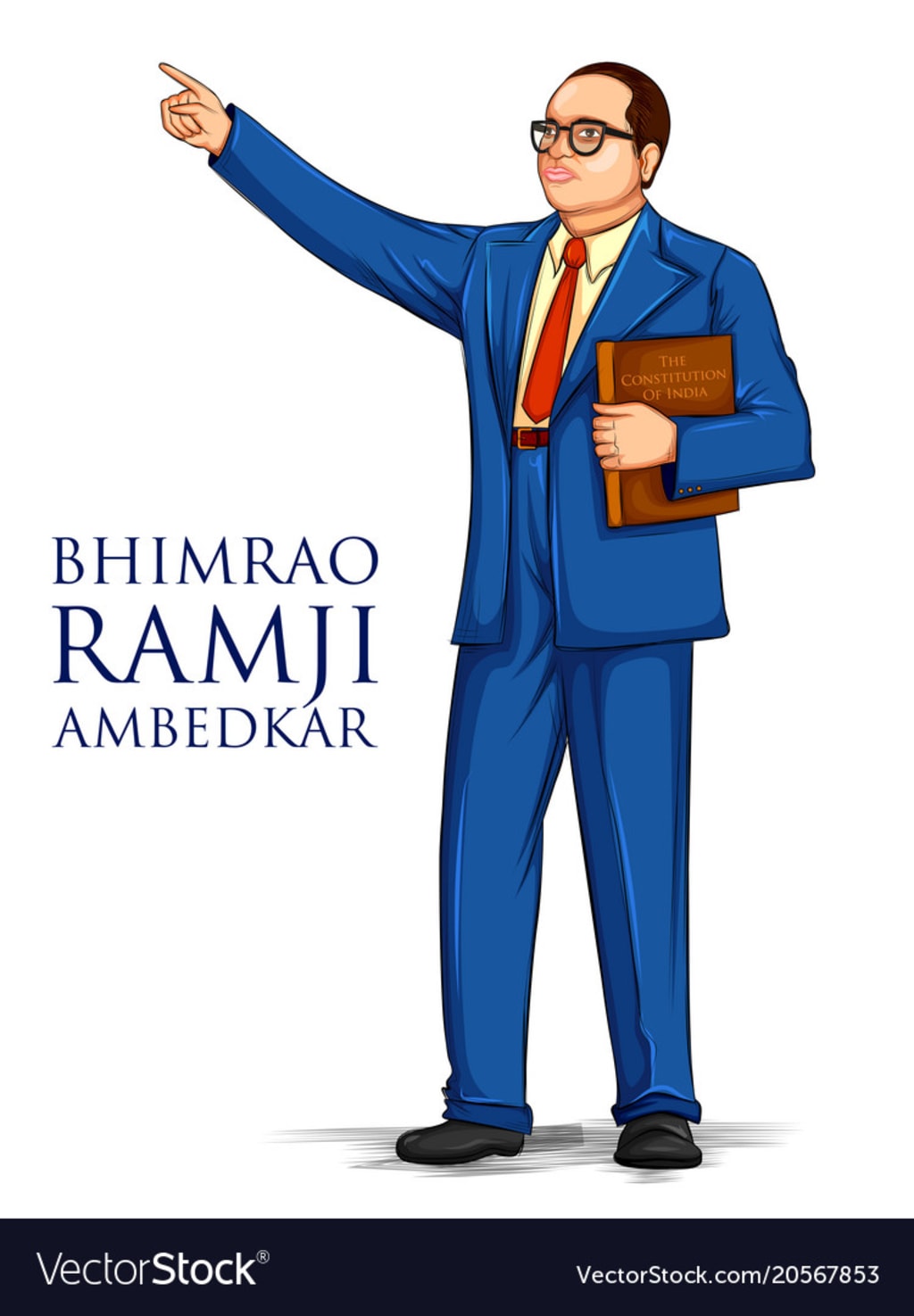Dr. B.R. Ambedkar : Biography & Life History
Dr. Bhimrao Ramji Ambedkar (1891–1956) popularly known as Babasaheb, was an Indian jurist, economist, politician and social reformer who inspired the Dalit Buddhist movement and campaigned against social discrimination against Untouchables (Dalits), while also supporting the rights of women and labour He was Independent India’s first law minister and the principal architect of the Constitution of India.

His Birth and Greatness Foretold
On April 14th, 1891 a son was born to Bhimabai and Ramji Ambadvekar. His father Ramji was an army officer stationed at Mhow in Madhya Pradesh – he had risen to the highest rank an Indian was allowed to hold at that time under British rule.
His mother decided to call her son Bhim. Before the birth, Ramji’s uncle, who was a man living the religious life of a sanyasi, foretold that this son would achieve worldwide fame. His parents already had many children. Despite that, they resolved to make every effort to give him a good education.
Early Life and First School of Ambedkar
Two years later, Ramji retired from the army, and the family moved to Dapoli in the Ratnagiri district of Maharashtra, from where they came originally. Bhim was enrolled at school when he was five years old. The whole family had to struggle to live on the small army pension Ramji received.
Two years later, Ramji retired from the army, and the family moved to Dapoli in the Ratnagiri district of Maharashtra, from where they came originally. Bhim was enrolled at school when he was five years old. The whole family had to struggle to live on the small army pension Ramji received.
The Shock of Prejudice – Casteism
Bhim began to notice that he and his family were treated differently. At high school he had to sit in the corner of the room on a rough mat, away from the desks of the other pupils. At break-time, he was not allowed to drink water using the cups his fellow school children used. He had to hold his cupped hands out to have water poured into them by the school caretaker.
Bhim did not know why he should be treated differently – what was wrong with him?Once, he and his elder brother had to travel to Goregaon, where their father worked as a cashier, to spend their summer holidays. They got off the train and waited for a long time at the station, but Ramji did not arrive to meet them. The station master seemed kind, and asked them who they were and where they were going.
The boys were very well-dressed, clean, and polite. Bhim, without thinking, told him they were Mahars (a group classed as ‘untouchables’). The station master was stunned – his face changed its kindly expression and he went away.Bhim decided to hire a bullock-cart to take them to their father – this was before motor cars were used as taxis – but the cart-men had heard that the boys were ‘untouchables’, and wanted nothing to do with them.
Finally, they had to agree to pay double the usual cost of the journey, plus they had to drive the cart themselves, while the driver walked beside it. He was afraid of being polluted by the boys, because they were ‘untouchables’.However, the extra money persuaded him that he could have his cart ‘purified’ later! Throughout the journey, Bhim thought constantly about what had happened – yet he could not understand the reason for it. He and his brother were clean and neatly dressed.
Yet they were supposed to pollute and make unclean everything they touched and all that touched them. How could that be possible?Bhim never forgot this incident. As he grew up, such senseless insults made him realise that what Hindu society called ‘untouchability’ was stupid, cruel, and unreasonable. His sister had to cut his hair at home because the village barbers were afraid of being polluted by an ‘untouchable’.
If he asked her why they were ‘untouchables’, she could only answer -that is the way it has always been.” Bhim could not be satisfied with this answer. He knew that -it has always been that way” does not mean that there is a just reason for it – or that it had to stay that way forever. It could be changed.
An Outstanding Scholar
At this time in his young life, with his mother dead, and father working away from the village where Bhim went to school, he had some good fortune. His teacher, though from a ‘high’ caste, liked him a lot. He praised Bhim’s good work and encouraged him, seeing what a bright pupil he was. He even invited Bhim to eat lunch with him – something that would have horrified most high caste Hindus.
The teacher also changed Bhim’s last name to Ambedkar – his own name.When his father decided to remarry, Bhim was very upset – he still missed his mother so much. Wanting to run away to Bombay, he tried to steal his aunt’s purse. When at last he managed to get hold of it, he found only one very small coin. Bhim felt so ashamed. He put the coin back and made a vow to himself to study very hard and to become independent.Soon he was winning the highest praise and admiration from all his teachers.
Matriculation and Marriage
In due course, Bhim passed his Matriculation Exam. He had already come to the attention of some people interested in improving society. So when he passed the exam, a meeting was arranged to congratulate him – he was the first ‘untouchable’ from his community to pass it.Bhim was then 17 years old. Early marriage was common in those days, so he was married to Ramabai the same year.
He continued to study hard and passed the next Intermediate examination with distinction. However, Ramji found himself unable to keep paying the school fees. Through someone interested in his progress, Bhim was recommended to the Maharaja Gaekwad of Baroda.The Shahu Maharaja granted him a monthly scholarship.
With the help of this, Bhimrao (‘rao’ is added to names in Maharashtra as a sign of respect) passed his B.A. in 1912. Then he was given a job in the civil service – but only two weeks after starting, he had to rush home to Bombay. Ramji was very ill, and died soon afterwards. He had done all he could for his son, laying the foundations for Bhimrao’s later achievements.
Studies in the USA and the UK
The Maharaja of Baroda had a scheme to send a few outstanding scholars abroad for further studies. Of course, Bhimrao was selected – but he had to sign an agreement to serve Baroda state for ten years on finishing his studies.
In 1913, he went to the USA where he studied at the world-famous Columbia University, New York. The freedom and equality he experienced in America made a very strong impression on Bhimrao. It was so refreshing for him to be able to live a normal life, free from the caste prejudice of India. He could do anything he pleased – but devoted his time to studying. He studied eighteen hours a day.
Visits to bookshops were his favourite entertainment!His main subjects were Economics and Sociology. In just two years he had been awarded an M.A. – the following year he completed his Ph.D. thesis. Then he left Columbia and went to England, where he joined the London School of Economics. However, he had to leave London before completing his course because the scholarship granted by the State of Baroda expired. Bhimrao had to wait three years before he could return to London to complete his studies.
Return to India – Nightmare in Baroda
So he was called back to India to take up a post in Baroda as agreed. He was given an excellent job in the Baroda Civil Service. Bhimrao now held a doctorate, and was being trained for a top job. Yet, he again ran into the worst features of the Hindu caste system. This was all the more painful, because for the past four years he had been abroad, living free from the label of ‘untouchable.’
No one at the office where he worked would hand over files and papers to him – the servant threw them onto his desk. Nor would they give him water to drink. No respect was given to him, merely because of his caste.He had to go from hotel to hotel looking for a room, but none of them would take him in. At last he had found a place to live in a Parsi guest house, but only because he had finally decided to keep his caste secret.He lived there in very uncomfortable conditions, in a small bedroom with a tiny cold-water bathroom attached.
He was totally alone there with no one to talk to. There were no electric lights or even oil lamps – so the place was completely dark at night.Bhimrao was hoping to find somewhere else to live through his civil service job, but before he could, one morning as he was leaving for work a gang of angry men carrying sticks arrived outside his room. They accused him of polluting the hotel and told him to get out by evening – or else! What could he do? He could not stay with either of the two acquaintances he had in Baroda for the same reason – his low caste. Bhimrao felt totally miserable and rejected.





Comments
There are no comments for this story
Be the first to respond and start the conversation.